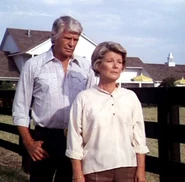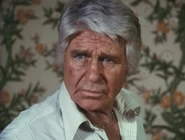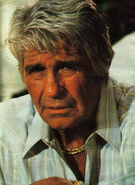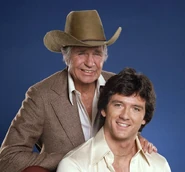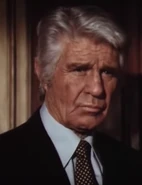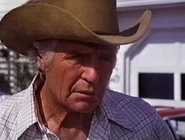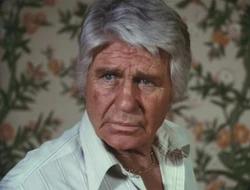 | |
| John Ross "Jock" Ewing Sr. † | |
| Occupation: | Chairman of Ewing Oil (1930-1982) President of Ewing Oil (1930-1977) co-owner of Southfork Ranch (1938-1982) |
| Marital status: | Married |
| Spouse(s): | Amanda Lewis (1927-1935); Miss Ellie Ewing (1936-1982, his death) |
| Parent(s): | Leander Ewing |
| Sibling(s): | Jason Ewing |
| Children: | Ray Krebbs J.R. Ewing (deceased) Gary Ewing Bobby Ewing |
| Other relatives: | Nancy Shaw (sister in-law) Jamie Ewing (niece) Jack Ewing (nephew) Lucy Ewing (granddaughter) Bobby Ewing II (grandson) Betsy Ewing (granddaughter) Molly Whittaker (granddaughter) John Ross Ewing III (grandson) Christopher Ewing (grandson) Unnamed son (JR's son with Cally: no name has ever been stated) (grandson) Unnamed daughter (JR's daughter with an unknown woman) (granddaughter) Margaret Krebbs (granddaughter) Lucas Krebbs (grandson) |
| Played by: | Jim Davis Dale Midkiff Dallas:The Early Years |
| Appears on: | Dallas |
| “ | Nobody gives you power, real power is something you take! | ” |
–Jock Ewing | ||
John Ross "Jock" Ewing, Sr. (1909 - 1982) was the husband of Miss Ellie Ewing, and father of J.R. Ewing, Gary Ewing, Bobby Ewing, and Ray Krebbs. He founded Ewing Oil in 1930 and was the patriarch of the Ewing family.
Jock played by Jim Davis from 1978 to 1981. In Dallas: The Early Years, he was portrayed as a younger man by Dale Midkiff.
Personality[]
He was the man who single-handedly made Ewing Oil the largest independent oil company in Dallas. He was the six-foot-three, blue-eyed powerhouse who fell madly in love with Eleanor Southworth. He was the aggressive wildcatter who saved Southfork Ranch from doom, only to be seduced by ranching itself. He was the man who sired four enormously talented young men to carry on the Ewing name. He was Jock Ewing, a legend in Texas and a passionate believer in the superiority of the Lone Star State.
History[]
Early life and career[]
Jock was born just before World War I, one of two sons in a family of very modest means, their only distinction being that a distant relative James L. Ewing, had given his life bravely at the Alamo. From the time could walk, he was off to the burgeoning oil fields, learning all that he could. It was an exhilarating time. Since the oil strike at Spindletop, Texas, in 1901, the fortunes to be made in oil had been moving away from the Rockefel-fads in Pennsylvania to the Lone Star State, where any smart, able man had a shot at instant wealth. The only trouble, Jock found, was many of these men were also desperate cutthroats, men who would calmly in the back to steal your claim. A certain combination of toughness 'mm-nino was required to survive, and Jock Ewing had it.
Jock was an extremely bright young man and he concentrated on, developing expertise in the methods of extracting oil from the once it was located. Then nothing could stop him; no geological barring outfox him. A particular specialty of his in those days was the practice of breaking through limestone deposits by shooting the well nitroglycerin He was paid well for his work, and on one of his jobs he made a friendship with Willard "Digger" Barnes, who could literally smell exactly where to drill. A plan took shape in Jock's mind. In a days, the two men had pooled their resources and struck out on their as wildcatters.
At this same time, in 1927, Jock married a frail young girl named Amanda Lewis. There was trouble in the marriage from the start, stemming from Amanda's rather nervous nature. As Digger smelled out oil, as the two enacted busting their guts to get equipment and start drilling, Amanda was alone for long periods in the makeshift town around the fields. It was a jetty "community," and Jock would carry enormous guilt for many years for having put poor Amanda into the middle of it.
For every new millionaire, there were hundreds of broken and angry men milling about, up tono good. Drunkenness and shoot-outs were rampant, fist-to-face violence was a normal part of each waking hour. The temporary Ewing home was under attack nearly every night by men in search of food, of money. Amanda became terrified of leaving the house and barricaded herself in when Jock wasn't there. She did not complain, instead, she grew thinner, paler, more drawn, and distant. Worried, Jock urged her to return to her family until he could find a proper home, but she persisted, saying that her place was with him.
Finally, a another gunfight outside in the street, poor Amanda had a complete mental breakdown, from which, the doctors said, she would never recover. Jock placed Amanda in the care of a hospital in Dallas and himself lived right out on the fields. He became a man obsessed. The fields were all he had, and he had to strike oil, he had to have money to send Amanda to a private hospital in Colorado where, in the doctors' opinion, lay the only remote chance of her recovery. He pushed Digger perhaps harder than he should have. Yes Digger could locate oil, but—darn it—he got drunk the minute he did, never pulling himself together long enough to put in a decent day's work on the rig.
Jock was impatient and stern with him, not understanding his friend's compulsion, and more than once he ended up trying to knock some sense into Digger's drunken lump. Jock brought in his brother, Jason, hoping he would help stabilize the venture.
Ewing #1 came in. That day, hat in hand, looking up to the Lord and thanking him, Jock experienced a happiness he had never known before. He Immediately moved Amanda to the Colorado hospital and channeled the rest of the income from Ewing #1 into new sites.
But trouble was still in hand with Digger—and with Jason as well! Jock was at first furious and then disgusted when his partners kept losing their shares of the money in drunken poker games. As wells 2, 3, 4, and 5 came in, Jock soon found himself with new partners, each with a paper that showed he had won Digger's and Jason's interests in the well. Each time, Jock would search all over town and then finally find Digger and Jason holed up somewhere, nursing a bottle.
When Jock could get them sobered up, they would stagger back to work. This time, on #6, Jock was determined that his partners would keep their shares. He took the leases on the new site in his name only, so Jason and Digger couldn't lose their shares if they tried.
When Ewing #6 came in—the biggest strike yet—Jock returned from town to the site to find two drunk, violent men with a menacing look in their eyes. Digger screamed at him, railed, shrieking that he had found out what a crook jock was—that he had put his own name on the lease as sole owner.
Jock tried to explain his reasons for doing so, about a separate agreement, but Digger was out of his head and tried to kill him. Jock finally had had it with both of them. If Digger and Jason wanted to drink themselves into oblivion, then fine, but not as his partners. Digger stayed on a murderous bender for a number of days, during which he firmly planted in his head and his heart that Jock Ewing had cheated him and that one day he would settle the score. Jason left for parts unknown.
Without Digger, the strikes in new fields were less precise, but Jock worked even harder and rapidly parlayed money from the working wells into the purchase of whatever raw acreage he could get, hoping to find more oil one day. The Ewing name was rising to prominence. His land was in thousand-acre parcels all over the state, and years later his investments paid off handsomely. For a few dollars an acre back then, Jock came to own not only new oil fields, but also natural gas fields, rich mineral deposits, and acreage to lease for cotton. When the Colorado doctors told Jock that Amanda's condition was permanent, with no hope of any mental recovery, Jock sadly got a divorce in Dallas in 1930. Shortly thereafter, he happened to see a young woman named Eleanor Southworth. The second that Jock saw her—those dazzling blue eyes, that flashing smile, the laughter of her hair as she galloped on her horse (in the most unladylike fashion)—Jock felt his heart give way. She was wildly beautiful and Jock eagerly asked around about her. The news was not good. She was the daughter of the most distinguished rancher in the territory, Aaron Southworth, who made no secret whatsoever of his opinion of oilmen: He hated them.
The second piece of news, which made Jock grimace, was that Digger Barnes claimed "Miss Ellie," as everyone called her, was his girl. Jock wrestled with his conscience—and also his good sense, which told him not to tangle with Barnes one more time—but when he saw Ellie again, he was filled with an elation and passion that he could not contain. Not even when Ewing #1 came in had he felt this way. So, after one long deep breath, Jock went after her, hell-bent on marriage. Incredulously, Miss Ellie was just as overwhelmed by him, and she agreed to marry Jock. It was the happiest moment of his life.
The consequences of Jock and Ellie's love in those early years was decidedly mixed. Yes, the Southfork Ranch was saved by Jock's money, set Jock secretly was forced to find a way to make up the enormous financial drain fast, before he lost hold of his assets. When he had agreed to get Southfork out of debt, he had no idea bow much money it would take, and then, on top of that, how many thousands nod thousands that Aaron needed to get it back to a proper working condition. Jock knew that Southfork was Ellie's lifeblood and so, for her sake, he continued to pour money into it. It was worth it to see her so happy. It was even worth it to take old man Southworth's constant haranguing about the ruination of Texas by oilmen.
But where was Jock to find the cash he desperately needed? Be- the ranch, his payments due on equipment and mortgages, and the huge s for Amanda's care, he was strapped, Then a good buddy from way back, a lawyer whom Jock trusted, Sam Culver, offered him a partnership on the fields that Sam's elderly uncle, Jonas Culver, owned- The onty problem was that Jonas refused to sell. He was like Southworth, bitterly opposed to the oil industry. But Sam had an idea . . .
When Jock first heard it. he refused to go in on the deal. He told Sam he couldn't do it, couldn't put Jonas in a sanatorium, what with his former wife's condition . . . Sam said for him to think about it—it wouldn't be but for a month or so—and afterward they'd set Jonas up to live like a king for the rest of his life. When Jock got back to Southfork that night, Aaron handed him the estimates of how much it was going to cost to replenish the cattle. Looking at the man's lowered head, seeing Ellie's pained expression at her father's pride lying so vulnerably on the table, Jock just smiled and slapped Aaron on the back, assuring him that it was no problem. The next day, against his better judgment, Jock went to Sam and agreed to the partnership. Years later, in 1982, Sam's second wife, Donna Culver, discovered Sam's journals that told what happened;
- "March 1st—Today I got a court order to have Jonas committed to Signal Mountain Sanatorium and had myself appointed custodian of his estate."
- "March 27th—Today, as custodian of Jonas's estate, I sold to Ew-ing/Culver all but 40 acres of Jonas's land. The money is in an account in his name and he'll get a 25% royalty from all producing wells. Next week I'll release him from the sanatorium. Neither Jock nor I wanted to do things this way, but the old codger left us no option. Anyway, now he'll be a rich man despite himself."
- "April 12th—Lord, oh, Lord, what have we done? Jonas killed himself today."
Jock was to carry this secret heavy on his heart for the rest of his life.
On the domestic front, things were progressing nicely until Jock started drilling on Section 40 and hit oil. Aaron was unspeakably angry and, for a moment, Jock saw that same mad gleam in his eyes that Digger Barnes had had so many years before. Jock explained that the land was obviously barren, useless, worthless, hell, they were building practically a highway along it from Braddock, and after all the money he had spent . . . Southworth raged, reducing Miss Ellie to tears and then to anger, directed at Jock. Unable to stand Ellie's distress for long, Jock reluctantly gave in and ordered the wells capped.
As if rewarding Jock, Miss Ellie gave him the most precious gift imaginable: a healthy, robust son named (John Ross Ewing, Jr. Jock was on cloud nine over this child, as was Aaron. The two of them, walking together around the ranch one evening, discussed whether this boy, nicknamed J.R., would be an oilman or a rancher. Jock was certain the kid was oil but good-naturedly went along with Aaron's fantasy that he was going to be a rancher. Something then bonded the two men; it was more than respect, more than friendship. It was more a silent pact of trust of one generation with the next. Jock was to preserve both options for his son; he understood that. That evening Aaron gave Jock one of his most prized possessions, an 1892 six-shot Colt, double-action service revolver. It was his way of welcoming Jock to the South-worth family,
Two years later Miss Ellie presented Jock with a second son, Garrison, and Jock smiled even more broadly, envisioning the expanding executive offices of Ewing Oil.
After the bombing of Pearl Harbor in 1941, Jock enlisted in the Army Air Corps and, as a colonel, was stationed overseas. After two agonizngly long years in London, Jock had an affair with a young nurse from Texas, Margaret Hunter, that was abruptly ended when Jock was shipped off to France.
When Jock returned to the States in 1945, he couldn't live with his conscience and he told Miss Ellie about the affair, frightened that she would leave him, or, rather, throw him off of Southfork. He was forgiven by her and was amazed, not for the last time, by this extraordinary woman's depth of compassion and ability to understand. What neither of them knew at the time was that Margaret Hunter had returned to Texas carrying Jock's child. The late 1940s brought another gift to the family, son Bobby, and the Ewing family line was ensured- Aaron passed away, but he had lived to see all of his grandsons.
By necessity, Jock had to struggle with managing the ranch and its finances, which drove him to distraction, since he absolutely abhorred book-work and didn't know beans about ranching. It wasn't until 1950 that he found a foreman, Hutch McKinney, whom he felt he could trust with the running of Southfork. Now he could concentrate on Ewing Oil's expansion with a plethora of new wells in Kilgore, Midland, and Odessa and also, once again in his life, have some free time for himself.
Not since he was a child had Jock been able to pursue the interests that he adored: hunting and fishing. He had made two good friends in the oil industry who had tastes similar to his own, Marvin "Punk" Anderson and Lucas Wade. And when the boys were old enough, he took them along to Landowne Reserve, near Caddo Lake on the Louisiana side, where he taught them all about tracking and wilderness survival.
In 1952, on Election Day, as the rest of the Ewing family sat around the new Southfork television set watching the returns as Eisenhower beat Stevenson, Jock slammed the ranch books shut, took off his glasses, muttered something lo Miss Ellie, and stormed his way into town. He found foreman Hutch McKinney drinking in the Wild Bronc Saloon and he fired him on the spot for padding the feed and supply bills. A fight ensued. After Jock beat the living daylights out of McKinney, he told him that no one could steal from Southfork Ranch and get away with it and if he so much as tried to steal one more thing, he'd kill him.
Later that night, Jock found McKinney back at the bunkhouse and threw him out of it. That was that; Jock Ewing was back running the ranch as well as Ewing Oil. It wouldn't be until the late 1960s, when Ray Krebbs was old enough, that Jock would have a foreman whom he trusted, As the years went by, the differences between Jock's sons became apparent. The eldest, J.R., pleased jock since he clearly had the makings of an oil baron—in fact, since he was five years old. And the youngest, Bobby —whom Jock unabashedly spoiled—was taken with both ranching and Ewing Oil. But it was the middle son, Gary, who proved to be such a disappointment to jock. Although Gary had an affinity for ranching, Jock thought he had too much ranch air in his head. His whole attitude frustrated Jock. It was as if the boy were in another world—he loved to paint, for land's sake—so Jock left Gary's upbringing largely to Miss Ellie.
Life in Dallas[]
In later years, as Jock grew enamored with ranching and left more and more of the responsibility for running Ewing Oil to J.R. and Bobby, he drew very close to Ray Krebbs, who seemed to be just the kind of son Gary should have been. It was a shock—but somehow not nearly the kind of shock one would have thought—when, in 1980, Jock learned that Ray was his son, by Margaret Hunter Krebbs.
By 1978 Jock had largely retired from Ewing Oil, although he remained Chairman of the Board. For the next three years he would periodically step in when the going got tough for J.R. and Bobby, between whom the leadership fluctuated, but for the most part he concentrated on ranching.
In the fall of 1978 Jock suffered a massive coronary that landed him in the intensive care unit at Dallas Memorial Hospital and necessitated a heart bypass operation in order to save his life. It was a warning signal to him and his family of his advancing years. Before, no one, not even Jock himself, had even contemplated the -notion that one day he might not be able to do everything he had always done. He had to slow down, and the family took this too much to heart. They patronized him, coddled him—particularly Miss Ellie —and if ever there was a man whose pride wouldn't allow such a thing, it was Jock.
It was only natural, then, that when the lovely former Ewing Oil employee, Julie Grey, returned to Dallas and was seeking companionship that Jock would be attracted to her, and she to him. To his family, he was an invalid. To Julie, he was the tall, powerful, handsome man he always was, But the two were careful to keep the relationship within the bounds of friendship, though passion was lurking dangerously close. But whether or not it would have progressed to anything more, neither had a chance to find out, as Julie was murdered by two of J.R.'s business associates.
As Jock more fully recovered, he and Ellie grew close once again, only to be threatened later by his confession of having been married previously. Amanda had been a secret all of these years. His timing was unfortunate, Ellie was undergoing severe medical problems—unbeknown to him—and it frightened her that Jock was apparently capable of divorcing someone who was ill. Her reaction—one of enormous anger—stemmed from fear, and she lashed out at him rather unfairly. But once she traveled with Jock to Colorado and saw Amanda for herself—what a state she was in—she forgave Jock completely, and the two of them vowed to care for Amanda for the rest of her life. The past rose once again to threaten Jock in 1980, Jock had given Ray Krebbs a Section of Southfork upon which to build his own home, and when the ranch hands broke ground, they discovered a skeleton. It turned out to be the remains of Hutch McKinney, the foreman Jock had fired in 1952.
In a nightmarish chain of events, Assistant District Attorney Cliff Barnes – Digger’s son – built a case against Jock, accusing him of murder. The evidence at the trial was overwhelmingly against Jock. McKinney had been shot with Jock’s gun (the one Ellie’s father had given him), he had been killed the night that witnesses heard Jock threaten him, and evidence was presented that testified that Jock’s sometimes volatile temper. But, in the end, Jock was cleared. On his deathbed, Jock’s old friend and enemy, Digger Barnes, confessed to killing McKinney himself.
After that ordeal, Jock wanted to get back the rhythm of his life:riding, roping, jogging, talking with his family at the big breakfasts and dinners, spending time with the little grandson whom J.R. had presented him with, playing games of backgammon with Ellie at night, but it was not to be. The reason this time, like so many times before, was Gary. Ellie had blamed Jock for driving Gary away from the ranch, away from her, in the past. This time, in the fall of 1980, it was worse (though it was actually JR., not Jock, who did any forcing). She was infuriated by Jock’s deep affection for and camaraderie with his newfound son Ray and by the fact that, once again, JR and Bobby were at odds. Ellie felt that Jock had abdicated his role as father and was simply ignoring the other boys, their boys, in favor of Ray.
Matters between the couple took another turn for the worse when Jock entered into a partnership with Punk Anderson and Lucas Wade for the Takapa development project, a plan to convert swampland on the East Texas Louisiana border into a resort. Miss Ellie, not knowing that Jock was one of its developers, was fighting the project with the Daughters of the Alamo on behalf of the state’s environmental groups. When she found out that Jock was involved, she exploded. Their misunderstanding was so bad that Jock moved off Southfork, and Ellie began divorce proceedings in 1981. Only the personal and political savvy of Bobby resolved the Takapa issue amicably, and Jock and Ellie were reunited in an even stronger way than before. They celebrated with a lengthy second honeymoon in Europe.
Death and legacy[]

Upon their return, Jock was summoned by the State Department to Washington, D.C., where he was asked to lead a drilling venture in South America. Jock accepted the assignment, working down there for several weeks in some of the thickest, most deadly jungle territory in the world, If the terrain didn’t worry him, the political unrest did. However, he successfully completed his assignment, and a jubilant Ewing family expected him to return to Dallas in time for the 1981 Ewing Barbecue. Then came the shocking news: the helicopter that was to have taken Jock to the South American airport had been caught in a storm and was reported lost. J.R., Bobby, and Ray flew down immediately to search for Jock, and on the bottom of a jungle lake in the middle of nowhere they found Jock’s medallion – proof that he had gone down in the crash. The boys returned home with the confirmation. Their daddy, Ellie’s husband, was dead.
Jock Ewing’s death affected not only his family, but also hundreds of Ewing Oil employees, and the oil market itself. It was unthinkable that Jock was no longer there to control those Ewing boys, J.R. and Bobby, For control he did. He once said to Bobby, “I’m not trying to influence you, I’m tellin’ you what I want you to do.” Jock Ewing was a man who knew what was right, knew how to handle people, and tried to pass his wisdom on to his sons. The extent to which he succeeded is debatable.
Jock left many things behind him as remembrances. His Lincoln Continental with the license plate "EWING 1” is still parked at Southfork; and his corner table at the Cattleman’s Club, his seat at the Jaycees, and his per-sonal box at the Dallas Cowboys can only be filled by one of his sons. He also left a legend with a group of men at the Colverton oil field. They still remember their millionaire boss, with his bare hands, fighting the devastating fire there in 1960, And perhaps, in a way Jock would not have liked, he will also be remem-bered by the terms of the will he left, the cause of feud after feud within the family over the control and activities of Ewing Oil.
But the end of Jock Ewing’s story was best summed up by Miss Ellie at the 1982 Oil Baron’s Ball, The Texas Independents had set up the Jock Ewing Memorial Scholarships – which each year are awarded to four young oilmen in the making – at Southern Methodist University. That special night. Miss Ellie said of her husband:
- “Jock Ewing was a great man, measured in the only true value of a man – not in money or power, but in friends. As I look around, I see so many of you that called Jock friend. And he was my husband, but more than that he was my best friend. I know how much you all miss him, but in a way he'll always be alive in your memories, and in his family. And now, through the scholarships at SMU, I know how proud he’d be if he knew what you had done for him, and perhaps he does. For him, and for me, I thank you. My life will never be the same without him, but Jock, of all men, believed that, whatever happened, you have to be ready to face tomorrow. And so we will. But I’ll always know that my sons had the finest father and I was married to the finest man that God ever put on this earth. I love you, Jock.”
Dallas (2012 TV series)[]
Although dead, Jock's legacy continues to carry on within the Ewing family as he is mentioned several times by J.R. and Bobby. He is currently buried on Southfork Ranch, along with Miss Ellie and J.R. To make up for lost time, J.R. offers to teach John Ross everything Jock taught him about the oil business. He even tells him Jock's famous quote to Bobby, "Nobody gives you power, real power is something you take."
Quotes[]
"Any man can win when things go his way, it's the man who overcomes adversity that is the true champion."
"When your back is to the wall remember that a cornered animal is the most dangerous."
"Sit down and shut up, JR."
"I'm mad as hell, boy!"
"Sick? You mean drunk!" - Jock to the sisters Shepard after Kristin tries to make the excuse that Sue Ellen wasn't feeling well last night.
"I'm not tryin' to influence you. I'm TELLIN' you what to do." - Jock to Bobby.
Jock Ewing on an subelty.... "A lack of it turns competitors to enemies and enemies into fanatics."
Gallery[]
Trivia[]
- After Jim Davis' death, artist Ro Kim painted a portrait of the actor in his role as Jock Ewing. The portrait became a focal point of the Dallas set and was featured in a number of episodes. The painting now hangs in the home of Larry Hagman, who played protagonist J.R. Ewing. The Southfork Ranch in Parker, Texas, where Dallas exteriors were shot, features a different Jock Ewing portrait as a focal point of its "Jock's Living Room". Jock drove a 1977 Lincoln Mark V with the license plate EWING 1, which is still on the grounds of Southfork, parked in one of the gift shops.


